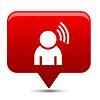 Our lesson of the day? Savings is never too cool for school.
Our lesson of the day? Savings is never too cool for school.Back-to-school shopping season is approaching fast and we've learned a thing or two on how not to burn a hole in your wallet. Time to whip out that No. 2 pencil. We've compiled a few ways to save without sacrificing the fun of the shopping season.
Buy used books
Don't judge a book by its cover. Instead, save the criticism for the hefty sticker price traditional campus books stores charge for required texts. On a budget? No problem. With college students shelling out hundreds--sometimes thousands--of dollars on textbooks each year, check out used books stores and online shops like half.com and amazon.com as a viable way for frugal-minded collegians to save a few bucks.
Organize before shopping
Make a list of the back-to-school supplies you need ... and don't shop without the list. This will eliminate over spending on items that are unnecessary. If you're not sure of the supples needed, e-mail the teacher or instructor. Maybe you don't really need that expensive calculator after all.
One thing you will need to put on your list? An alarm. Check out iHome's bluetooth clock radio/alarm and speakerphone for
Procrastinate
Wait to shop. The longer you wait, the better the sales. Putting a hold on back to school shopping may increase your anxiety, but in the end the savings are very rewarding. Kelli Grant, Sr. Consumer Reporter for SmartMoney.com says "buying basic items now while they're on sale, but wait until after school starts to buy the rest. Once the back-to-school rush has calmed down, retailers will often put traditional back-to-school items on clearance."
Ask for adjustments
If a purchased item goes on sale around two weeks after you bought it, bring it back with the receipt for a price adjustment. The store will refund or credit you the difference, which may end up being really helpful.
Save with large retailers
Don't rule out Target, Walmart and Costco. Big retailers such as these usually offer many discounts, especially for back-to-school shoppers looking to save on basic supplies. Best Buy offers great values on computers and electronics perfect for homework and play. Check out their helpful back-to-school checklist here.














